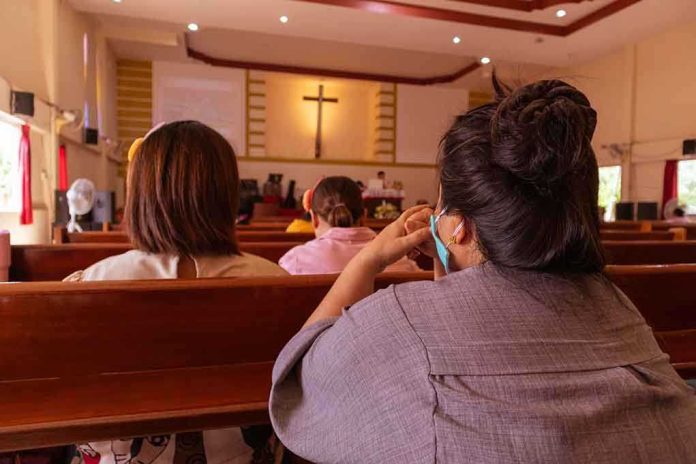
Oregon’s controversial abortion mandate forces pro-life organizations to finance the very procedures they exist to oppose, sparking a high-stakes religious liberty battle now before the Ninth Circuit.
Key Takeaways
- Oregon Right to Life is challenging a state mandate requiring employers to provide abortion coverage in health insurance plans, claiming it violates their religious beliefs.
- The organization argues that the law unconstitutionally discriminates by granting religious exemptions to churches while denying them to other faith-based groups.
- Attorney James Bopp Jr. cites a recent Supreme Court decision that invalidated a similarly structured exemption system as precedent for their case.
- The state contends the law is neutral and that ORTL doesn’t qualify as a religious employer under the statute’s definitions.
- The case highlights growing tensions between progressive state policies and religious liberty protections under the First Amendment.
Religious Freedom Under Fire in Oregon
Oregon Right to Life (ORTL) has escalated its fight against the state’s Reproductive Health Equity Act to the Ninth Circuit Court of Appeals, challenging what they describe as government overreach into religious matters. The contested law requires most employers in Oregon to provide health insurance coverage for abortion procedures and contraception, regardless of the organization’s moral or religious objections. While the statute includes exemptions for certain religious employers, ORTL argues these exemptions are discriminatory and unconstitutionally narrow, effectively forcing them to finance practices they fundamentally oppose on religious grounds.
The case represents a direct collision between progressive state policies and constitutional religious liberty protections. A district court previously dismissed ORTL’s challenge, reasoning that the organization fails to meet the state’s definition of a religious employer because it doesn’t impose religious requirements on its members or staff. This distinction has become the central point of contention in the appeal, with ORTL arguing the government has no authority to determine which religious organizations qualify for protections and which don’t.
Constitutional Arguments Take Center Stage
ORTL’s legal team, led by prominent conservative attorney James Bopp Jr., has presented compelling arguments that the Oregon law violates multiple constitutional principles. They contend the mandate discriminates between different types of religious organizations, creating what Bopp describes as a “religious gerrymander” that unfairly burdens groups with pro-life convictions. The appeal takes particular aim at the government’s attempt to define what constitutes a legitimate religious organization, arguing this represents governmental overreach into matters of faith and doctrine.
“There are numerous assertions in the record by Oregon Right to Life that their belief in the sanctity of individual human life and opposition to abortion is based upon religious tenets,” stated James Bopp during oral arguments before the Ninth Circuit panel.
The state, represented by Carson Whitehead, counters that the law is neutral and generally applicable, arguing ORTL seeks an overly expansive interpretation of religious liberty protections. “Oregon Right to Life argues for an extraordinarily broad construction of the free exercise clause,” Whitehead told the court, defending the state’s position that the law makes reasonable distinctions between different types of organizations. This clash of interpretations highlights the deepening divide over how broadly religious exemptions should apply in an increasingly secular regulatory environment.
Supreme Court Precedent Strengthens ORTL’s Position
ORTL’s appeal has been significantly bolstered by a recent Supreme Court decision in Catholic Charities Bureau, Inc. v. Wisconsin Labor & Industry Review Commission, which granted tax-exempt status to a Catholic nonprofit under similar circumstances. The high court’s ruling established that governments cannot selectively apply exemptions that favor certain religious organizations over others. This precedent directly challenges Oregon’s approach of narrowly defining which faith-based groups qualify for exemptions from the abortion coverage mandate.
“This case is saturated with examples of the exact things the Constitution prohibits. The First Amendment does not permit the government to favor secular organizations over religious ones. It does not permit the government to favor only the religious organizations of which it approves. It does not permit the government to draft laws in a way that achieves a religious gerrymander to ensure disfavored religious organizations cannot receive certain benefits. And it does not permit courts to second-guess whether an organization’s religious beliefs are, in fact, religious. The Ninth Circuit panel’s decision should be easy since the trial court disregarded the principles in so many ways.”
ORTL’s executive director, Lois Anderson, has expressed confidence in their legal position, emphasizing the fundamental injustice of forcing a pro-life organization to fund the very procedures it exists to oppose. “The attempt by the state to force Oregon Right to Life to finance abortion—the precise human rights violation we are dedicated to opposing—is blatantly unconstitutional and unjust. Oregon Right to Life is exempt from the Mandate and well within our First Amendment rights to follow our sincerely held beliefs,” Anderson stated in a press release discussing the appeal.
Broader Implications for Religious Liberty
This case represents more than just a dispute over health insurance coverage—it strikes at the heart of religious liberty protections in America. If Oregon prevails, it would establish a dangerous precedent allowing governments to selectively determine which religious organizations qualify for First Amendment protections based on arbitrary criteria. Such a ruling would particularly impact organizations with traditional values that increasingly find themselves at odds with progressive policy agendas being implemented across blue states.
The Ninth Circuit panel has not yet indicated when it will issue a ruling on the case. Whatever the outcome, the losing side will likely appeal to the Supreme Court, which has shown increasing willingness to defend religious liberty claims under the current conservative majority. With the Biden administration attempting to expand abortion access nationwide while the Trump administration’s judicial appointees continue to reshape the federal bench, this case could become a pivotal battleground in the ongoing culture war over religious freedom and abortion rights.




